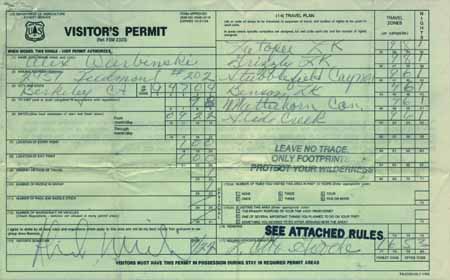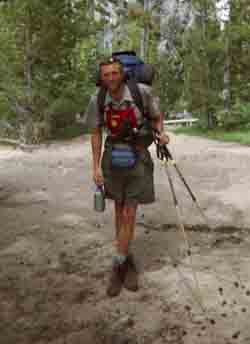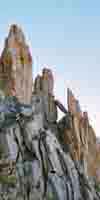
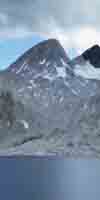

High Sierra
Backpacking
Trail Guide
Forums
Sierra
Weather
Gear
High Sierra
Backpacking Permits
on the
Sierra Crestline
And
Fire, Fire Restrictions, Alerts and Notices
Contact & Permits
for
National Forests, Parks
and
Wilderness Areas
between
Lake Tahoe and Mount Whitney
Languages
Trail Skills
Mountain
Safety
Safety
Incidents
Food
Planning
40 Days to Whitney Introduction Tahoe-Yosemite
Trail Arts
More
Information
News
and
Science
Social
| Digital Trailhead |
Lake Tahoe Basin Management Unit |
Stanislaus National Forest |
Humboldt-Toiyabe National Forest |
Yosemite National Park |
PCT or TY? |
Map |
| Sequoia-Kings Canyon National Park |
| National Forest & Wilderness list | Ranger Districts |
Trailhead Permits |
National Forests map | Contacts |
High Sierra
Backpacking Permits
Permits |
||||||||
National Parks and Forests Popular Permit INFORMATION
|
||||||||
North Sierra
Section under construction... |
|
South Sierra
Sequoia-Kings Canyon NP
|
||||||
Wilderness Areas |
||||||||
contact information
North Sierra Forests, Parks,
and their
Wilderness Areas
High Sierra
|
West Flank |
East Flank |
Tahoe Basin |
|
| Carson Range | |
| Desolation Wilderness Map | |
Tahoe Basin
| Carson Range | |
| Meiss Country Map | |
South of Carson Pass
El Dorado National Forest Permits |
|
| Mokelumne Wilderness Map | |
North of Lake Alpine
Same as Above Toiyabe National Forest |
|
| Mokelumne Wilderness Map | |
South of
Lake Alpine & Ebbetts Pass
| Carson Iceberg Wilderness Map | |
South of Sonora Pass
| North Emigrant Wilderness Map | |
South of Bond-Dorothy Lake Pass
Same as Above Toiyabe National Forest |
|
South Sierra |
West Flank |
East Flank |
|
|
The North Sierra
|
||
Ranger Districts |
Yosemite National Park |
|
The National Forest are sub-divided into Ranger Districts. Backpacking permits are obtained from the Ranger District of the National Forest where our backpacking trip begins. E-Ticket Ride There have been exceptions to this rule. Various Rules That appeared to be a clusta-fruffle. Every popular trailhead has a minimum distance for camping from the trailhead. God knows what restrictions the various federal entities along the trail will come up with from year to year. Current Hiking Permit Limitations To assure our trip is not delayed by permitting problems, I highly recommend that everyone planning a long distance backpacking trip beginning anywhere between Lake Tahoe and Mount Whitney call the Ranger District that will issue their permit, and inquire about any special restrictions in force, the congestion-quota status of the trailhead and "zone," and ascertain if reservations are a wise option. Reservations are generally not necessary for the El Dorado, Stanislaus, or Toiyabe National Forests, with the exception of the Hoover Wilderness in the Toiyabe. Permit Ordering Ranger Districts generally have a "Call us and we'll leave it outside" policy. I've found that Ranger Districts will work with long distance backpackers who come from long distances. They will send you your permit, if you make your situation clear and are reasonably nice. If you are coming from the East Coast of the US, order, or at least inquire about your permit a couple of months early. If you are coming from Europe, order it as early as the Ranger District will send it to you. This will prevent a lot of problems. The permitting agency will take all of your information over the phone, fill out a permit for you, and mail it to you. This used to be standard policy, but has been abandoned, except in the case of long distance backpackers. Because it is really a drag to be delayed by permitting problems at the trail head, especially after all of the time, expense, and preparation required to put together a long distance backpacking trip, you really should order/inquire/reserve your permit early. To avoid delays on the phone when ordering your permit, be prepared to state the number of days you plan to be on the trail, the number of people in your party, and name the locations of your campsites. Have your information ready. The Ranger Districts are real good about getting permits in the mail a couple of times a week. Ranger District stations also have boxes outside their office where they will leave permits for early birds trying to hit the trail head early, if you call and ask. |
If you are one of the too many backpackers who are planning to start your backpacking trip from inside of Yosemite, especially Tuolumne Meadows and The Valley, you should know that the issuance of permits is highly restricted during peak Summer periods. This is also true of the Hoover Wilderness East of Yosemite. When I bring the trail guide through Yosemite I will build the Yosemite Permits Page where I will describe the current permitting policies, and the split between early reservations and trailhead permit availability. Heavy permit restrictions are required to prevent way too many people from crowding into the Yosemite backcountry at the same time. Therefore it is very wise to secure a reservation for any high season backpacking trips you plan out of Tuolumne Meadows or The Valley. I make dealing with Yosemite's overcrowding easy. I have never begun a backpacking trip in Yosemite. I have always walked in from neighboring or distant National Forests. If you do not have a reservation you may be forced to wait for up to a couple of days before a permit becomes available. I have seen up to 25 backpackers who lacked reservations lined up early in the morning at the Tuolumne Meadows permit office (pictured on the banner at the top of the page) before it opens, seeking one of the limited number of backcountry permits becoming available that day. My Solution Thus my trail guide's focus on the Tahoe to Yosemite and Pacific Crest Trail's routes from Highway 108 into the Northern Yosemite backcountry may be ideal trips for you. All of this Yosemite permit hassle can be avoided by beginning our backpacking trip in Yosemite from outside Yosemite, from a trail head where there is no wait for permits. It is only five days hiking across the Yosemite backcountry through the Emigrant Wilderness, and maybe four days from Twin Lakes outside of Bridgeport. There are literally dozens of awesome trail heads in the National Forests just outside of Yosemite National Park. Four of my favorite trips ending in Yosemite begin in; Lake Tahoe (150 miles to Tuolumne Meadows), Sonora Pass (75 miles to TM), Little Antelope Pack Station, (110 miles to Tm, access near Walker, Ca, on hwy 395), Twin Lakes (near Bridgeport, Ca, Hwy 395, maybe 40 miles to TM. I'll have to look this up in my notes). Don't make the mistake of believing that Yosemite is the limit of Sierra Beauty. Yosemite is the center of Sierra beauty, and as such attracts enough traffic to diminish itself with congestion. |
|
Obtaining a Permit at the Trail Head |
||
Many of the remote trail heads in National Forests in the Northern Sierras have permit pads and pens in a box at the trail head for the convenience of local backpackers. Call the Ranger District of the trail head your trip begins in for specific information. Many of these trail head permits are stamped with restrictions, such as the "this permit is only valid in" that particular trail head's National Forest or Wilderness Area. I believe these "stamped" permits are a device to prevent people from taking these trailhead permits and attempting to use them in Wilderness Areas where permits are restricted. Call the Ranger District of the trail head you are interested in for more information about the availability of trailhead permits. If you are planning a long distance backpacking trip across restricted permitting areas, such as The Yosemite National Park, or your trip hooks into The John Muir Trail coming down from Lake Tahoe, as I often do, you must have a valid permit issued by the Ranger District of your originating trailhead. A permit stamped with "this permit is only valid in" will NOT do. Don't depend on trail head permit boxes for backpacking trips that cross into different, or restricted, permitting authorities. Although it is easy to obtain a thru permit outside of the restricted areas, even during the "high season," you should understand that Yosemite is trying to hard to restrict unlimited access to Yosemite and the John Muir Trail by restricting the number of permits they issue, and surrounding Forests are apparently trying to help by limiting the range of self-issued trail head permits. As I said above, they are often restricted. So you long distance backpackers should order your permit from your trail head's Ranger District over the phone and have them send it to you well before your departure date. This is especially true for long distance backpacking trips that will cross into high-traffic areas. |
||
Endless Backpacking Trips |
||
There are literally thousands of short and medium length backpacking trips that can be cut out of the Sierra Crest Trails between Lake Tahoe and Mount Whitney either following the Crest, or incorporating a section of the Sierra Crest. For instance, you can hike a section or two of the Tahoe to Whitney trail each year, until you have walked the entire length of the Sierra Crest. Though the routes along the Sierra Crest are this site's main focus, every trail junction and subordinate trail head along the Sierra Crest is also described, and is a viable entrance/exit option to put together a short or medium distance backpacking trip incorporating a section along the Sierra Crest. Each of these trails can bring you onto, and off of, the Pacific Crest, John Muir, or Lake Tahoe to Yosemite trails on your own personal custom designed excursion. I am building the permits section of this guide so that people using this site to put together their own epic trips along and around The Sierra Crest can easily obtain the permitting information and permits they need. I have included the following list of the National Forests, Wildernesses, and Ranger Districts that administer the trails between Lake Tahoe and Mount Whitney along the Sierra Crest to make this easy. If I did my job well you should be able to easily figure out how to find the Forest and Ranger District necessary to obtain the permits and information you will need to plan and successfully execute your trips into, or across, the most remote, as well as the most congested permit areas during the High Sierra high season. If you don't obtain reservations you may want to begin your trip from outside the congested areas, but you will get in and through. The following list will bring you to all the information you need about all of the Permitting Authorities between Lake Tahoe and Mount Whitney. Well, it will when the site is finished... Congratulations to Rick and Suzanne! You see everything if you Backpack the High Sierras long enough... |
||
| Backpack Lake Tahoe to Mount Whitney! |
||
|
||
| Backpack from Lake Tahoe to Yosemite! | ||
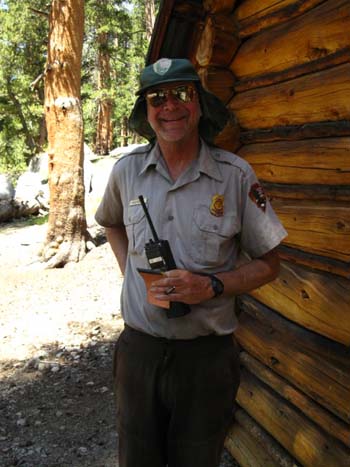 |
||
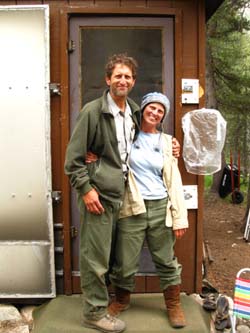 |
||
Congratulations to Ranger Rick Sayer and his new wife Suzanne. They were married on Aug 13, 2009 in Big Pete Meadow just North of the Bishop Pass Ranger Station, with the local trail crew as witnesses. |
Above: The Evolution Valley Ranger, during coordination of the evacuation of a downed Sierra Club group hiker, Aug 20, 2009. | |
Obtaining Permits |
|||||||||||||||||||
| This site is under construction... | |||||||||||||||||||
North
|
|||||||||||||||||||
Forest, Park, and Wilderness Information Thus some of the North Sierra wilderness information below presents two links, each to different National Forests for the same wilderness area. The upper links below are to contact information for obtaining permits from that forest or park. The lower link is to that unit's descriptions of their wilderness area. The marked routes on the maps link to more detailed maps. The red dots link to trail guide entries. Grayed out links are duplicates of the link above it, unless the information is different..
Mokelumne Wilderness Map
Emigrant-North Yosemite Wilderness Map
North Sierra Facts Both the Stanislaus and Toiyabe National Forests each administration three wilderness areas. They share admin of Mokelumne and Carson Iceberg Wilderness, but the Toiyabe exclusively oversees the Hoover Wilderness while Stanislaus has sole jurisdiction over the Emigrant Wilderness.
|
|||||||||||||||||||
| South Sierra Nevada Mountain Range | |||||||||||||||||||
South Sierras
This site is under construction...
|
|||||||||||||||||||
INFORMATION |
MAPS | MILES | |||||||||||||||||
|
|
|
|||||||||||||||||
| more to come...stay tuned! | |||||||||||||||||||
High Sierra National Forests, Parks, and Wilderness Areas
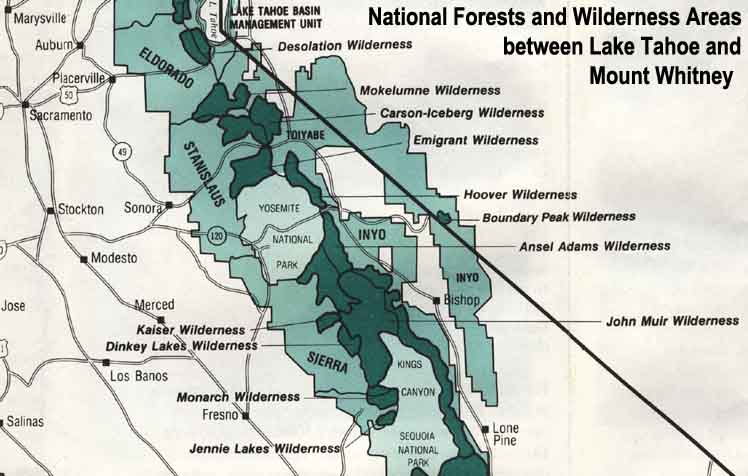
Map Credit: Forest Service, Pacific Southwest Region, "A Guide to National Forest Wilderness in California."
Large High Sierra
National Forest Map

Our guide to the Sierra Crest, including the Tahoe to Yosemite, the Pacific Crest and the John Muir Trails

